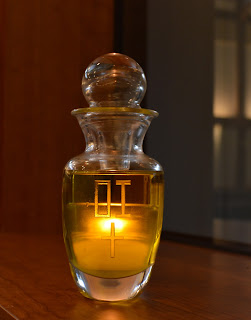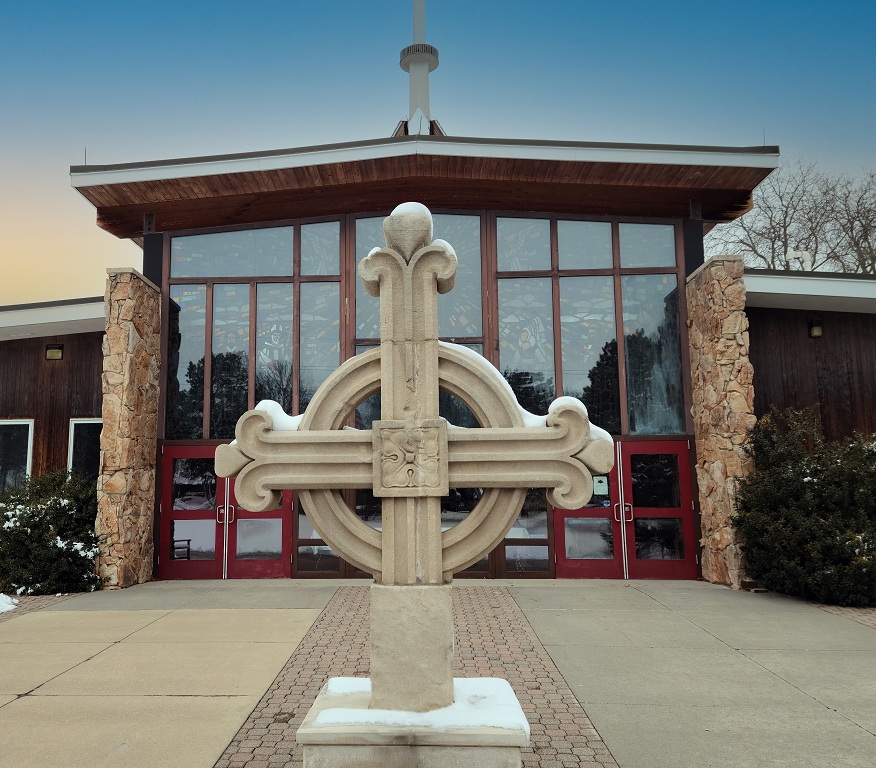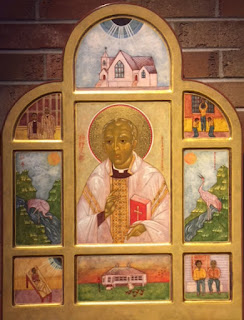Lent 5C, Unction
Psychologists tell us that our sense of smell is more powerfully linked to our brains, and our memories, than any other sensory perception. I certainly believe them. For me, one of those potent olfactory memories is the smell of that pink bottle of Johnson’s Baby Lotion. Sometimes it’s hard for me to fight back the tears, even though my youngest child is 13, when I smell that moisturizer—all I have to do is close my eyes and I see my kids fresh from the bath; I hear the music of their giggles as we play the stinky feet game, and I rejoice in the gift of love and I marvel in God’s sacred miracle of new life. Today’s Gospel reading gives us another story of anointing with perfumed oil, one that I don’t doubt stayed with the disciples just as tangibly as baby lotion does with me: Mary pours her perfumed oil on Jesus’ feet and wipes them dry with her hair. John tells us the whole house was filled with the luxurious odor. It’s a moment that’s almost scandalous with both intimacy and extravagance. That price, 300 denarii, was a year’s wage. Over and over again, John’s Gospel shows us experiences of God’s abundant grace: at the start of Jesus’ ministry in chapter two, at the Wedding in Cana, the water was transformed into the best wine people had ever tasted—more than the crowd could possibly drink…in the middle of Jesus ministry in chapter six, 5000 people were fed and there were twelve baskets of left-overs—and here, grace upon grace smells like an absurd amount of the most expensive and lovely perfume, the fragrance of which when released from the bottle soaks into every possible crevice. There is no place in the house where the abundance of the perfume cannot be detected. There is no place in the world, there is no place in our lives, where the abundance of God’s grace cannot be found.
God’s abundant grace is freely given, and, sadly, it can be freely rejected. Judas, foreshadowing his rejection of Jesus and betrayal in the Garden, is unable to open his eyes, his nose, and his heart to the gift that has been given; he lives not in the joy of abundance, but in the shadow of fear, greed, and scarcity. Jesus’ reply to Judas’ selfishly motivated complaint that the perfume could have been sold to feed the poor—“You always have the poor with you,” has sometimes been used to justify complacence towards the needs of the poor—but this should never the case. Jesus, in his response, is quoting Deuteronomy 15:11, which says in full: “Since there will never cease to be some in need on the earth, I [God] therefore command you, ‘Open your hand to the poor and needy neighbor in your land.’” Mary’s generous gift was an expression of her deep love, and also the action of a true disciple: the washing of feet. Jesus received from her what he would soon offer to his other disciples, at the Last Supper. She is “wiping” his feet with her hair as he will “wipe” (same Greek verb) their feet with his towel. This washing, this anointing, this unction, is a sacred rite, and with it we continue our teaching series on the sacraments.
The anointing by Mary in today’s story is not the anointing of a king or priest—that anointing is done on the head or hands—in Jewish tradition the feet would only be anointed on a body being prepared for burial, and Jesus confirms this in verse seven: “She bought it so that she might keep it for the day of my burial.” This burial kind of unction might be the first one that you think of—you may know it as “extreme unction,” part of what the church historically called “last rites.” But, since 1972, the Roman Catholic church has stopped referring to this rite as “extreme unction,” and, as Anglicans always have, now calls it “anointing of the sick.” This name change better emphasizes the fact that this rite of anointing is available to all those suffering in mind, body or spirit, at any time (and not just for use by those near the point of death). In the Book of Common Prayer, anointing of the sick is found on page 456, in the liturgy called “Ministration to the Sick,” and the rubrics there note that unction can be done with oil, or simply with laying on of hands. At All Saints we offer anointing with oil each week at our Wednesday noon Eucharist, and I frequently offer anointing as part of my chaplain duties at the med center.
There are more than forty passages in the Bible that refer to anointing. We read in James 5:14—"Are any among you sick? They should call for the elders of the church and have them pray over them, anointing them with oil in the name of the Lord,” and in Mark 6:13—"They cast out many demons, and anointed with oil many who were sick…” There are even more passages referring to a different kind of anointing, however. Throughout history, especially Israel’s history, kings, prophets, and priests were anointed as a symbol of receiving divine grace. The word “messiah” in Hebrew, and the word “Christos” in Greek, literally mean “the anointed one.” Exodus 29 and 30 describe the anointing of Aaron and his sons to become priests, and give a recipe for making the anointing oil, which was used not only to anoint priests, but also to anoint the tent of meeting, the altar table and all its utensils, the altar of incense and the altar of sacrifice...There are many verses about people and things being anointed throughout Exodus, Leviticus, and Deuteronomy, and there is the anointing of King David in Samuel and King Solomon in First Kings---but our most familiar reference is found in everyone’s favorite Psalm, Psalm 23. You probably know by heart: “Thou preparest a table before me in the presence of my enemies: thou anointest my head with oil; my cup runneth over.” This anointing someone's head is a sign of God’s blessing and favor, of celebration, abundance, and joy.
Jesus, actually, was not anointed as a High Priest in accordance with the ceremony described in Exodus, but he is considered to have been anointed by the Holy Spirit at his baptism. (You’ll remember that four Sundays ago, in Luke 4, we heard Jesus quote Isaiah 61:1—“The spirit of the Lord God is upon me, because the Lord has anointed me; he has sent me to bring good news to the oppressed, to bind up the brokenhearted, to proclaim liberty to the captives, and release to the prisoners; to proclaim the year of the Lord’s favor, …to comfort all who mourn;”)
You witness this priestly kind of anointing very frequently—at every baptism we perform. As they make the sign of the cross on the baptized person’s forehead, the priests say: “...you are sealed by the Holy Spirit in Baptism and marked as Christ’s own forever,” (BCP 308). This is an example of anointing done to set apart and make sacred, part of the outward and visible sign of the grace bestowed in baptism. As sisters and brothers of Christ, we are, each of us, anointed into the priesthood of all believers. Through this anointing, we all become “a kingdom of priests to serve our God” (Rev 5:10).
For Anglicans, there are two different kinds of sacred anointing oil for these two different kinds of anointing—one oil for healing, and another oil for consecration. The oil at baptism—the “Chrism”, we call it—must be consecrated by a bishop, who prays that “all those who are sealed with it may share in the royal priesthood of Jesus” (BCP 307), The oil used for healing is blessed by a priest, who prays, “as your holy apostles anointed many that were sick and healed them, so may those who in faith and repentance receive this holy unction be made whole” (BCP 455).
Like every sacramental rite, anointing is an outward sign of God’s abundant grace, a sign of the Kingdom of God come near. My prayer for us all this week is that we find concrete ways to recognize and acknowledge the anointing we have all received in baptism as a sign of our joining God’s priestly kingdom—we are all called to be priests to the world, through Jesus, God’s Messiah, the Christ, the one, true Anointed King. May every parent with a bottle of pink baby lotion rejoice in God’s miracle of new life as they anoint their little ones. May every parent or grandparent or teacher who lays hands on a crying child to comfort and heal a skinned knee or a broken heart know that the love of Jesus is flowing through their touch. May every All Saints Minister of Care who blesses the people they visit with prayers and sacrament know that they bring the healing and comforting power of the Holy Spirit. May every friend who reaches out to comfort someone in grief know they are sharing in Mary’s anointing of Jesus feet. May every person here who reaches out to offer a smile, and a meal, and hope, to those in need know that the spirit of the Lord God is upon you, because the Lord has anointed you and sent you to bring good news to the oppressed, bind up the brokenhearted, proclaim liberty to captives and release to prisoners; and proclaim the year of the Lord’s favor. May the oil of God’s abundant grace anoint all of our heads, and flow over our hearts and our hands, and from there, overflow on and on, covering the whole world with sacred blessing.




Comments
Post a Comment